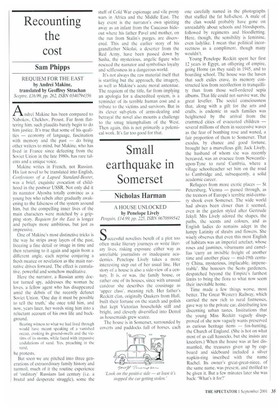Recounting the cost
Sam Phipps
REQUIEM FOR THE EAST by Andrei Makine, translated by Geoffrey Strachan Sceptre, f16.99, pp. 262, ISBN 0340794356 Andrei Makine has been compared to Nabokov, Chekhov, Proust. Far from flattering him. such plaudits barely begin to do him justice. It's true that some of his qualities — economy of language, fascination with memory and the past — do bring other writers to mind, but Makine, who has lived in France since defecting from the Soviet Union in the late 1980s. has rare talents and a unique voice.
Makine writes in French, not Russian. His last novel to be translated into English, Confessions of a Lapsed Standard-Bearer, was a brief, exquisite evocation of childhood in the postwar USSR. Not only did it its narrator Alyosha totally convince as a young boy who rebels after gradually awakening to the falseness of the system around him, but the compelling inner lives of the main characters were matched by a gripping story. Requiem for the East is longer and perhaps more ambitious, but just as impressive.
One of Makine's most distinctive tricks is the way he strips away layers of the past, freezing a fine detail or image in time and then returning to it again and again from a different angle, each reprise conjuring a fresh nuance or revelation as the main narrative drives forward. The effect is cumulative, powerful and somehow meditative.
Here the narrator, a Russian army doctor turned spy, addresses the woman he loves, a fellow agent who has disappeared amid the debris of the recently defunct Soviet Union. 'One day it must be possible to tell the truth,' she once told him, and now, years later, her words sting him into a reluctant account of his own life and background.
Bearing witness to what we had lived through would have meant speaking of a vanished ocean, evoking its ground-swells and the victims of its storms, while faced with impassive undulations of sand. Yes, preaching in the sand,
he protests.
But soon we are pitched into three generations of extraordinary family history and turmoil, much of it the routine experience of 'ordinary' Russians last century (i.e. a brutal and desperate struggle), some the stuff of Cold War espionage and vile proxy wars in Africa and the Middle East. The key event is the narrator's own spiriting away as an infant from the Caucasus hideout where his father Pavel and mother, on the run from Stalin's purges, are discovered. This and the earlier story of his grandfather Nikolai, a deserter from the Red Army, have been passed down by Sasha, the mysterious, angelic figure who rescued the narrator and symbolises loyalty and selflessness in a dangerous world.
It's not always the raw material itself that is startling but the approach, the imagery, as well as Makine's acute moral antennae. The requiem of the title, far from implying an apologia for a discredited system, is a reminder of its terrible human cost and a tribute to the victims and survivors. But in its clever sub-plots of arms-dealing and betrayal the novel also mounts a challenge to the smug triumphalism of the West. Then again, this is not primarily a polemical work. It's far too good for that.


























































 Previous page
Previous page